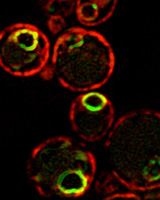New Insights on Cellular Nutrient Supply in Model Organism Baker’s Yeast
5 December 2014

Figure: Marius Lemberg
Heidelberg researchers have gained new insights on the function of a presenilin-related protein in the model organism baker’s yeast with regard to the regulation of the cells’ nutrient supply: This membrane protein is a protease called Ypf1. It regulates the amount of nutrient transporters making it to the cell surface and controls the absorption of nutrients from the cell’s environment as could be shown by the researchers around Dr. Marius Lemberg of Heidelberg University’s Center for Molecular Biology. In humans, the related presenilin-1 gene, when mutated, is one of the factors which lead to a hereditary early-onset and severe form of Alzheimer’s disease, as Dr. Lemberg says. The scientist collaborated with colleagues in Rehovot, Munich and Freiburg. Their results were published in the journal “Molecular Cell”.
When Dr. Lemberg's team started its work it was only known that Ypf1 belongs to an unusual class of membrane proteases. These proteases are enzymes that are able to cleave peptide chains within cellular membranes. However, despite massive knowledge from yeast genetics as well as recently developed biochemical assays, Ypf1’s function in this process remained in the dark. “Since proteases like Ypf1 are working at the crossroads of essential cellular processes, their physiological tasks and the study of their substrates are an important research field,” says Dr. Lemberg, who closely collaborated with Dr. Maya Schuldiner of the Weizmann Institute of Science in Rehovot (Israel).
The breakthrough in understanding Ypf1 came with quantitative studies of the proteome, i.e. all the proteins in the cell. In the course of these experiments the researchers observed that in the absence of the Ypf1 protease, a high-affinity zinc transporter accumulates in individual fractions of the cell membrane. Moreover, with the help of systematic approaches the researchers were able to demonstrate that Ypf1 generally regulates how many of these nutrient transporters reach the cell surface. Thus, the protease controls the way in which nutrients are being taken up from the environment. The molecular biologists also proved that Ypf1 cooperates directly with components of the so-called ER-associated degradation pathway (ERAD) to dispose of surplus transporter proteins.
According to Dr. Lemberg, the Ypf1 protease also enables yeast cells to “sense” changes in the nutrition level and to react when the supply of nutrients declines and limitations of cell functions are imminent. The reduction of transporters is then being suspended. “The Ypf1 protease allows yeast cells to prepare themselves for starvation. This process is as important for unicellular organisms as a functional brain is for animals,” emphasises the Heidelberg researcher. As Dr. Lemberg says, these new insights form the basis for a molecular understanding of how cells control the composition of their membranes. The scientists hope to be also able to draw conclusions about the origin of human diseases, such as the hereditary early-onset form of Alzheimer’s.
The research group of Dr. Lemberg is a member of the DKFZ-ZMBH Alliance, the strategic collaboration between the German Cancer Research Center (DKFZ) and the Center for Molecular Biology of Heidelberg University (ZMBH). The research was funded in the framework of the Network Aging Research of the Baden-Württemberg Foundation as well as the university’s Collaborative Research Centre “Cellular Surveillance and Damage Response” (CRC 1036). In addition to the research team of Dr. Schuldiner, scientists of the German Center for Neurodegenerative Diseases in Munich and of the University of Freiburg have significantly contributed to this project.
Original publication:
D. Avci, S. Fuchs, B. Schrul, A. Fukumori, M. Breker, I. Frumkin, C. Chen, M.L. Biniossek, E. Kremmer, O. Schilling, H. Steiner, M. Schuldiner and M.K. Lemberg (2014) The Yeast ER-Intramembrane Protease Ypf1 Refines Nutrient Sensing by Regulating Transporter Abundance. Molecular Cell 56, 630-640 (4 December 2014), doi:10.1016/j.molcel.2014.10.012

